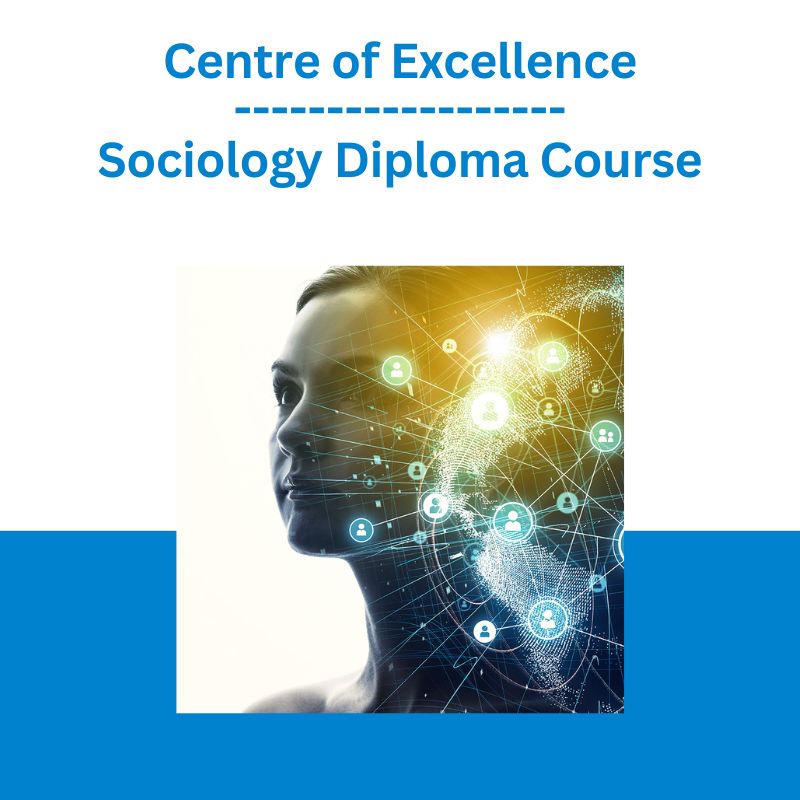*** Proof of Product ***
Exploring the Essential Features of “Centre of Excellence – Sociology Diploma Course”
What Will You Learn?
Have you ever thought about the different groups in society and wondered what brings them together, why they function as they do, and what forces shape groups and communities?
Sociology addresses these questions by helping us to get a clear understanding of society and the kinds of social processes that take place in different groups. It also helps us to better understand ourselves, by examining how social influence affects the way we think.
The Sociology Diploma Course guides you through this subject and its power to both study and change our world. You’ll learn the fundamental principles of sociology and gain a clear understanding of how the different mechanisms of society interrelate.
The Sociology Diploma Course begins with an explanation of the subject, its historical background and some key theoretical perspectives in sociology.
We’ll look at some important sociological perspectives and how they are used in sociology and shed some light on the theories of some prominent sociologists.
The course explores culture and subculture and the concept of society as a whole, including how societies influence the individuals that form them. We’ll take the discussion of society even further, by looking at the process of socialisation, followed by a dissection of the many forms of social groupings we find throughout the world, including an in-depth look at two of the major structures of a society’s existence – marriage and family.
You’ll discover the history of religion, religion as a sociological concept, various religious organisations and the different types of religion. Finally, we explore different forms of power and authority and sociology’s theoretical perspectives on government.
Course Syllabus
What will I learn on the course?
Module 1: Introduction to Sociology
10 parts
Introduction
Part 1: What is Sociology?
Part 2: Types of Sociology
Part 3: The Other Social Sciences
Part 4: What Does a Sociologist Do in Society?
Part 5: History of Sociology
Part 6: Theoretical Perspectives in Sociology
Test Your Knowledge
Key Learning Points Exercise
Module 1 Assessment
Module 2: Sociological Perspectives
7 parts
Part 1: The Importance of Theory
Part 2: Major Perspectives in Sociology – Functionalism
Part 3: Conflict Theory
Part 4: Symbolic Interactionism and Feminism
Test Your Knowledge
Key Learning Points Exercise
Module 2 Assessment
Module 3: Major Figures of Sociology
10 parts
Part 1: Why Sociology Emerged
Part 2: Auguste Comte (1798–1857)
Part 3: Harriet Martineau (1802–1876)
Part 4: Karl Marx (1818–1883)
Part 5: Max Weber (1864–1920)
Part 6: Émile Durkheim (1858–1917)
Part 7: Herbert Spencer (1820–1903) and Georg Simmel (1858–1918)
Test Your Knowledge
Key Learning Points Exercise
Module 3 Assessment
Module 4: Culture
6 parts
Part 1: What is Culture?
Part 2: Elements of Culture
Part 3: Pop Culture, Subculture and Cultural Change
Test Your Knowledge
Key Learning Points Exercise
Module 4 Assessment
Module 5: Society
7 parts
Part 1: What is Society?
Part 2: Pre-Industrial Societies
Part 3: Industrial and Post-Industrial Societies
Part 4: Theoretical Perspectives on Society
Test Your Knowledge
Key Learning Points Exercise
Module 5 Assessment
Module 6: Socialisation
8 parts
Part 1: What is ‘Socialisation’?
Part 2: Self-Development
Part 3: Theory of Moral Development
Part 4: The Importance of Socialisation
Part 5: Agents of Socialisation
Test Your Knowledge
Key Learning Points Exercise
Module 6 Assessment
Module 7: Sociological Groups
7 parts
Part 1: Social Groups and Organisations
Part 2: Types of Groups
Part 3: Group Size and Structure
Part 4: Formal Organisations
Test Your Knowledge
Key Learning Points Exercise
Module 7 Assessment
Module 8: Marriage and Family
7 parts
Part 1: What is Marriage? What is a Family?
Part 2: Types of Intimate Relationships
Part 3: Line of Descent and Stages of Family Life
Part 4: Types of Families
Test Your Knowledge
Key Learning Points Exercise
Module 8 Assessment
Module 9: Religion
7 parts
Part 1: What is Religion?
Part 2: History of Religion as a Sociological Concept
Part 3: Types of Religious Organisations
Part 4: Types of Religion
Test Your Knowledge
Key Learning Points Exercise
Module 9 Assessment
Module 10: Government and Politics
7 parts
Part 1: Authority
Part 2: Power and Forms of Government
Part 3: Politics in the United Kingdom
Test Your Knowledge
Key Learning Points Exercise
Conclusion
Module 10 Assessment
Who Would Benefit from This Course?
It will be of particular interest to anyone looking for a foundational level of knowledge from which to build upon with further study and will expose you to sub-topics within sociology in which you may wish to specialise.
It will also be interesting to you if you simply wish to better understand the world around you and your place within it.
Please see the full list of alternative group-buy courses available here: https://lunacourse.com/shop/










 Centre of Excellence - Chemistry Diploma Course
Centre of Excellence - Chemistry Diploma Course  Centre of Excellence - Astronomy Diploma Course
Centre of Excellence - Astronomy Diploma Course